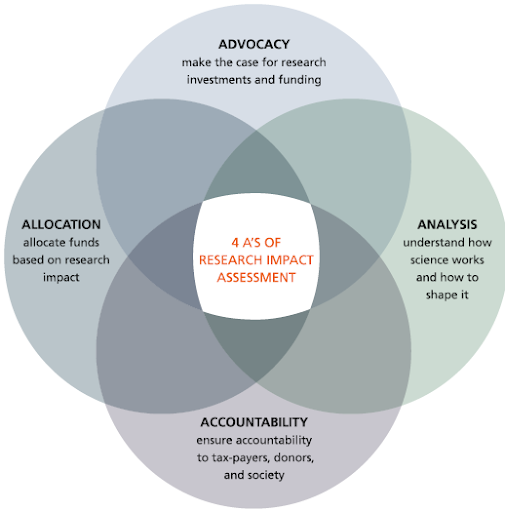Are certain types of funded research likely to bring about a greater impact? Are the benefits of funded research shared equitably? Can we build in, at the design stage, parameters which make a research project more likely to bring about greater impact? What actions can we take during a research project?
Professor Jonathan Grant posed these, amongst other questions, during the recent webinar Demonstrating Impact – Are we doing enough? in an analysis of impact and how to feed back findings into research strategies and policy making.
During the presentation Grant proposed an important shortcoming of the research impact assessment process, the lack of evidence to understand why certain programs have been impactful and what elements contribute to their success.

Grant suggests that funders are generally successful in three of the four areas depicted in the 4 A’s of Research Impact Assessment diagram shown above. While they are able to show the difference their funded research is making, allocate funds to programs that produce outputs, and demonstrate impact to stakeholders there is still work to be done on analysis and having the relevant data available for this. What makes this research impactful? And more importantly, how could funders leverage this knowledge?
With illustrations from three studies A ‘DECISIVE’ approach to research funding, The nature, scale and beneficiaries of research impact and an ongoing study linking Researchfish data with REF Impact Case Studies, Grant develops a set of guidelines, or “recipe book” to signpost funders and researchers with ways to design and execute research programs to optimise impact. Grant explains the evolution of these guidelines as more data becomes available.
Funders are encouraged to scrutinise the data they have collected on past research programs and projects either through Researchfish, or other methods, to understand which situations and conditions lead to greater impact and, use this knowledge to shape future research strategies and policy.
According to the data taken from the three studies we see that outward looking research projects tend to bring about greater impact. This suggests that funders should place resources in projects which operate across disciplines, encourage collaborations, and support engagement from a wide variety of stakeholders throughout all research stages. The roles and attitudes of project participants are also very important. Motivation and the ability to envision what success looks like are also influencing factors.
To see the full “recipe” for research impact, the video recording is available.
- Fund groups who have the motivation and ability to pursue society impacts
- Support engagement outside academic at various stages of the research process
- Fund clinical research
- Fund a broad portfolio of projects, as impact will only occur from a few projects
- Fund multidisciplinary research, as the research impact occurs when disciplines come together
- Fund research outside your core area, as other disciplines will contribute to impact
- Allow time for impact to occur
- Support and fund collaborations